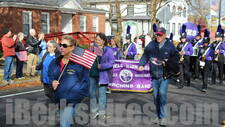Running on Fumes: Gas Prices Take Toll on Highway BudgetsBy Susan Bush
12:00AM / Monday, August 15, 2005
 | | Gas pumps reflected the latest gasoline price spike. |
The latest vehicle fuel price spike is delivering a harsh blow to most municipal highway department budgets.
Williamstown Highway Department Superintendent Scott Park and Adams Director of Public Works Thomas Satko said that the ever-changing, mostly-rising gasoline and diesel fuel prices have wreaked havoc with their fiscal year budgets.
“I can’t control it [fuel costs] and it’s almost impossible to calculate [fuel costs for fiscal year budgets],†Park said during an Aug. 15 interview. “It’s changing every day and it’s impacting everything we do here.â€
Fuel Prices Rise Again
Aug. 15 gas prices at fuel pumps located in the Northern Berkshire and Southern Vermont region told the tale: a Main Street, Williamstown, Cumberland Farms store self-service gas island showed prices of just shy of $2.62 per gallon for the lowest octane fuel, $2.72 for mid-level octane, and $2.84 for premium fuel. At the Village Market on Route 7 in Pownal, Vt., the pump price for lowest octane gas was at $2.45 per gallon and at a Route 7 Stewart’s Shoppe in Vermont, the lowest octane price posted at $2.49 per gallon of fuel. Diesel fuel was about $2.60 or more per gallon at the stations that do sell the fuel.
According to information at an American Automobile Association [AAA] web site, Aug. 15 Massachusetts average vehicle fuel prices were $2.51, $2.70, and $2.80 per gallon while the average per-gallon price for diesel fuel was listed at $2.58 per gallon. In Vermont, the state average price was $2.40, $2.59, and $2.70 per gallon for gasoline; the average diesel price was $2.60 per gallon state-wide.
Budgets Blasted
The Williamstown Highway Department has five dump trucks, two payloaders, two excavators, two tractors, a sidewalk plow, a street-sweeper, a roller, a grader, and a paver. The vehicles are used throughout the year for various specific projects and necessary tasks such as snowplowing and road maintenance.
The highway department’s fiscal year 2005 budget was set at $26,000, Park said. Because of price hikes, by the end of FY ’05, money spent on vehicle fuel totaled over $37,000, he added.
The fiscal year 2006 budget was calculated months ago, Park said. Town department budgets must be finalized and ready for the annual May Town Meeting, so calculations begin in January. When the FY ’06 highway department budget was being figured, Park based the department’s $29,000 fuel budget on a $1.81 per gallon cost.

Williamstown Highway Department Superintendent Scott Park |
“That’s already shot,†he said. “And there’s just nothing you can do. When we are doing our budgets, we are doing it at the beginning of the [calendar] year. These prices are changing daily.â€
“I keep thinking ‘maybe it will get better,’†Park said. “But I don’t see it happening, and everything we do is fuel-based.â€
Satko agreed with Park.
“We’ve had the same thing happen here,†he said. “We put our numbers together early in the year and it’s not the amounts we’re paying now. We know that we’ll probably run out of money by the end of June [June 2006, the end of fiscal year 2006]. We figured the gasoline at $1.81 per gallon and diesel at $2.01.â€
Even regularly scheduled fuel delivery costs have become to tough to estimate because of the constant price changes, Satko said. A 3,000-gallon delivery is expected on Aug. 16 or 17.
“I will not know the price until it is delivered,†he said.
In Adams, a DPW-sited fuel tank serves town police department and forest warden vehicles as well as highway equipment, and Satko said he can’t let the tank's fuel levels drop because of the number of vehicles that use the fuel.
Park and Satko said that they are at the mercy of a “port price of the day,†which is the price of the fuel sold at places like the Port of Albany, N.Y.. Delivery trucks and distributors acquire their fuel supplies at the ports, and the price they pay affects the price they charge their customers. Fuel delivery trucks are consuming fuel to deliver fuel.
“It’s not rocket science,†Satko said of rising fuel and fuel delivery costs.
A rise in additional costs has added to municipal woes, Park and Satko said.
More Cost Increases
Park said that blacktop costs are up about 5.1 percent over last year, largely because the ingredients, sand, stone, and oil, now cost more, and Satko noted that fuel is used to produce the substance, which adds to the cost.
Steel prices are impacting projects such as guardrail installation; the cost of guardrail has risen from $10 per foot to $16 per foot, Satko said. The price spike doesn’t necessarily mean elimination of guardrail projects, but can mean decreases in the amount of guardrail erected.
A snowy winter and heavy demand for snowplowing could mean big trouble for municipal highway department fuel budgets, Satko said.
“If we have a bad winter, we will run out of money for the trucks,†he said. “If we run out of diesel fuel or gasoline for the trucks, we’ll be asking Fin Com [town Finance Committee] for more money.â€
Park said the Williamstown highway department could be forced to alter some plans.
“There are certain things we wouldn’t do,†he said. “For example, bridge rails wouldn’t get painted, I’d use the money for fuel. Maybe some sidewalk work doesn’t happen so that the money can be used for fuel. This affects everything that we do, even the things we contract out.â€
Park and Satko emphasized that highway departments are not alone in municipal fuel cost struggles; rising heating fuel and electricity costs are affecting other municipal departments and buildings. Satko noted that when fiscal year 2006 budgets were calculated, heating oil costs were close to $1.31 per gallon.
The Williamstown DPW building is equipped with a waste oil burner and a wood-burning furnace, which have helped keep heating oil costs stable, Park said.
“We haven’t raised the heating oil [costs] in the five years that I’ve been here,†said Park.
Park said that the highway department budgeted $7,500 for electricity in fiscal year 2005 and $8,500 for fiscal year 2006.
“That’s a $1,000 increase and I don’t know if that’s going to be enough,†Park said.
Fiscal Year 2007 Looms
A few months from now, Park will be working to assemble a fiscal year 2007 highway department budget. If current fuel price conditions exist at that time, the task will be extremely challenging, he said, because the costs are rising to genuinely problematic proportions.
“We have to stay within 2 1/2 percent or ask [voters] for an override,†he said, referring to the state’s Proposition 2 1/2 property tax legislation. “With these prices and increases, it is possible to be mathematically impossible to stay within that. And the only other choice in that situation is laying people off.â€
Susan Bush can be reached via e-mail at suebush123@adelphia.net or at 802-823-9367.
|




















